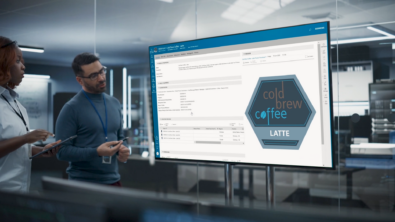The future of consumer products: Smarter, more personalized, and built to evolve

Products that don’t improve over time quickly lose their value.
Consumers today expect smarter, more responsive experiences—products that learn, adapt, and deliver ongoing benefits. A smart thermostat that adjusts to daily routines. A wearable fitness device that refines workout recommendations based on activity patterns. A washing machine that optimizes performance based on regional water conditions.
These aren’t just better products—they’re better experiences. And they’re only possible when manufacturers leverage real-time performance intelligence, AI-driven insights, and IoT connectivity to refine products continuously.
Companies that fail to do this will fall behind competitors who are already embedding intelligence into their products, building consumer trust, and extending product lifecycles with data-driven updates.
The problem: Traditional product development no longer works
For decades, product design followed a simple cycle:
- Develop the product
- Manufacture it
- Ship it to customers
- Collect feedback after months (or years)
That cycle no longer meets consumer expectations. It’s slow, reactive, and disconnected from real-world usage.
Companies leading the market aren’t waiting for consumer complaints or product obsolescence. Instead, they’re embedding traceability and lifecycle intelligence into their operations—creating a continuous loop between product design, consumer feedback, and performance insights.
This shift enables manufacturers to:
- Track real-world product performance and detect issues before consumers notice them.
- Use AI-driven insights to refine features based on actual usage patterns.
- Deliver software and firmware updates that improve functionality over time.
The result? Products that evolve, remain relevant, and build stronger brand loyalty.
How to build consumer-focused products with real-time intelligence
1. Turning data into action: IoT-driven performance tracking
Most companies collect product data—but few know how to use it effectively. IoT-enabled devices generate vast amounts of performance insights, but without structured analysis, manufacturers miss key opportunities for improvement.
With Industrial IoT (IIoT) and digital twin technology, manufacturers can:
- Monitor real-time product behavior and detect performance trends early.
- Automatically adjust software settings to improve efficiency and usability.
- Identify regional performance differences and optimize products for different markets.
For example, a home appliance manufacturer using Siemens’ IIoT solutions might detect that customers in certain regions frequently override default washing machine settings due to hard water conditions. Instead of assuming the design is optimal, AI-driven analytics can suggest adjustments, leading to a software update that fine-tunes water usage for maximum efficiency.
This is more than just data collection—it’s real-time product evolution.
2. Creating personalized consumer experiences with AI-driven insights
Consumers no longer accept generic, static products. They expect:
- Products that adapt to their habits.
- Seamless software updates that improve functionality.
- Integration with other smart devices for an ecosystem experience.
Siemens’ traceability & lifecycle intelligence solutions allow manufacturers to:
- Analyze real-time consumer feedback to understand which features matter most.
- Prioritize software updates based on actual usage data.
- Enable product ecosystems that integrate across connected devices.
- Extend product functionality and improve user experience with Siemens’ low-code application development platform, allowing manufacturers to create purpose-built apps 10 times faster with 70% fewer resources.
A luxury coffee machine brand leveraging Siemens’ analytics could track brewing preferences across thousands of users. If data reveals a growing demand for stronger coffee, the company can introduce a firmware update with a new “bold mode,” improving the user experience without requiring new hardware.
This level of adaptability drives long-term consumer engagement. Instead of replacing a product when it no longer meets expectations, consumers trust that it will continue to improve.
3. Aligning engineering decisions with market demand
For product engineers, the challenge has always been translating market expectations into actual design decisions. Traceability & lifecycle intelligence bridges this gap by:
- Predicting shifts in consumer demand based on real-world data.
- Identifying underused or problematic product features and eliminating inefficiencies.
- Reducing costly design iterations by basing future development on actual consumer behavior.
For example, a global consumer electronics manufacturer using Siemens’ lifecycle intelligence tools can:
- Analyze millions of real-world usage data points from connected devices.
- Identify a growing demand for hands-free operation.
- Adjust product roadmaps to prioritize voice-command technology in the next iteration.
Instead of guessing what consumers might want, manufacturers can build products based on proven demand.
The business impact: Why this approach wins
Companies that embed traceability and lifecycle intelligence into their development process gain a competitive edge in three key areas:
- Extended product lifespan: Products remain valuable longer, reducing obsolescence.
- Higher consumer satisfaction: Personalized, adaptive features improve usability.
- Increased brand loyalty: Consumers trust and stick with brands that continuously enhance their products.
In a rapidly changing market, companies that rely on static, unchanging products will struggle to compete with brands that use real-time intelligence to refine consumer experiences.
The next step: Are your products designed to adapt?
Smart, connected, continuously evolving products aren’t the future—they’re the present. Companies investing in real-time intelligence and adaptive product experiences will dominate the market. The ones that don’t? They’ll be playing catch-up.
Siemens provides the technology foundation to make this shift possible—helping manufacturers build smarter, more adaptable consumer products.
Want to learn more about creating unique consumer product experiences with IoT device integration?


